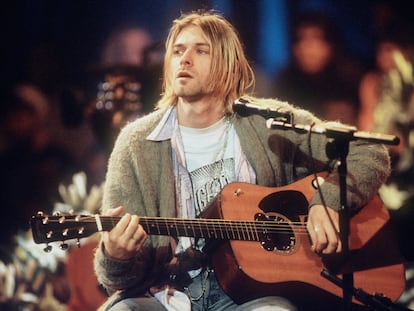Robbie Williams: The charming hooligan with the most number-one records in Britain
After distancing himself from Take That, the singer went on to fill stadiums across the world. But turning the Briton into a global star wasn’t an easy task, say his former press representatives
“Robbie is leaving Take That!” For some fans, the news was a tragedy that marked the summer of 1995. The most popular British boy band of all time was at the top of its game. They were, in fact, the UK’s biggest-selling band at the time, thanks mostly to their single Back For Good, which reached number one in 31 countries. Although he wasn’t the lead singer – a role reserved for Gary Barlow – Robbie Williams had the charisma and personality to carry the group. He was the youngest member and the most unruly: his addictions to alcohol and cocaine led to frequent outbursts. Such antics could not exist within the disciplined regimen of a boy band.
It is rumored that the manager of Take That expelled him as a result of photos that showed Williams at a party with the members of Oasis. The story may well point to the musician’s desire to go his own way. A year later, he released his first solo single, a version of George Michael’s Freedom, loaded with symbolism. It was a risky move. Who makes their debut with a cover of an overseas hit, much less a recent one? Some 26 years later, Robbie Williams holds many records, including being the soloist with the most number-one albums in his country. But at that time, nobody cared about his career. He was the first boy band member to leave a group and start a competing solo career, eventually surpassing his origins. The trajectory paved the way for Justin Timberlake (N’Sync) and Harry Styles (One Direction).
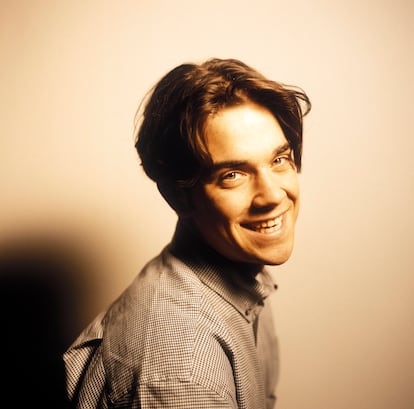
“Robbie had to earn respect and credibility. We already know the prejudices that the behavior of a boy band has for certain audiences. His sharp irony and that nerve typical of someone who knows that he is going to succeed, no matter what, made him magnetic. He had a company behind him willing to turn him into a superstar, and his commitment to generic pop-rock was a good asset to win over the public,” says Agustín Gómez Cascales, music critic and editor-in-chief of the magazine Shangay. He was a fan of Williams at the time, as was Patricia Alvarado, head of the music journalism blog Afterpop, who was 14 years old when the musician left what was then her favorite band. “With Freedom, Robbie was free to launch a glorious career. His former bandmates were out of the game, but what was liberating for me was his first album, Life Thru A Lens, which came into my life to unleash all that adolescent sexual desire and hooked me even more on Williams.”
For J. Martínez, from the fanzine Atajo Masivo, Take That ended when he finished school. “More than Robbie’s debut, I remember the weight of his absence in the video for How Deep Is Your Love?, which showed the other members of the group abandoned to their fate, covering Bee Gees on the brink of the abyss. Then his first solo track that pops into my head is Old Before I Die. That was the attempt of Guy Chambers, producer of the project, to plagiarize Oasis and achieve a sound familiar to millions of people.”
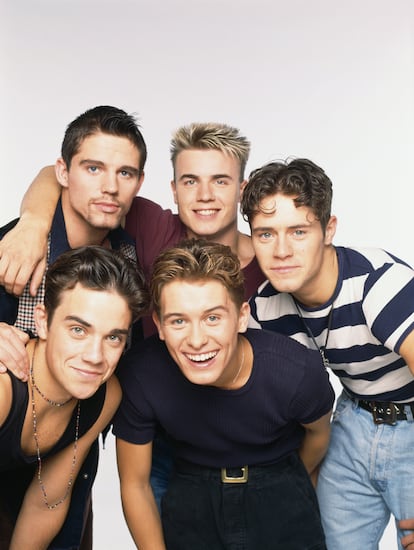
Life Thru A Lens was released 25 years ago, on September 29, 1997. To date, it has sold four million copies, but, at the time, it took a while to get momentum. The difference was made by his fourth single, the ballad Angels, which propelled Williams towards an even brighter stardom than the one shown on the cover of his album, where the idol appears surrounded by photographers. In the United Kingdom, the song still dominates lists of the best songs of the 20th century and leads the rankings of the most popular songs at weddings and funerals. In the UK, the star became meat for the tabloids: he was a versatile artist who appealed to children and grandmothers, executives, housewives and indie audiences. But he was more difficult to sell outside his country.
“When Angels became a hit, he became an international target and we got down to work, but we only managed to keep the base of Take That,” recalls Ángel Tejero, who was his press representative in the Spanish office of EMI at that time. It was worse in the United States and Canada, as Carole McDonald, then the EMI Toronto product manager, recalls: “I didn’t even know the boy band Take That. They weren’t that well known there, so people didn’t know who Robbie was. When he had more success in Europe, he came onto our radar, but it was hard.” “The new audience began to arrive with the single Millennium, in 1998, but when it hit it in Spain it was with Rock DJ in 2000,” adds Tejero. “It was hard work, because the company wanted to differentiate him from Take That and turn him into a singer for all audiences, and we didn’t achieve it until then.”
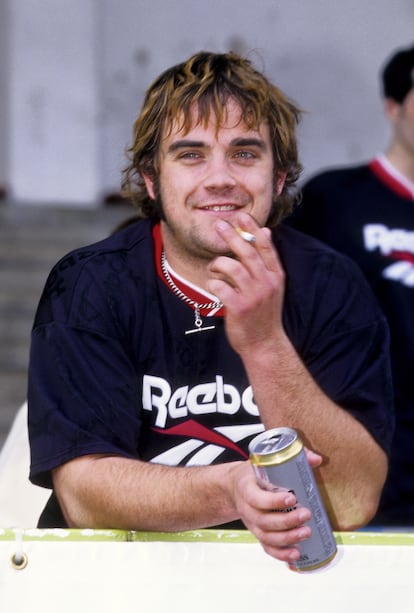
“It was very evident that he was aimed at the British market,” argues Gómez Cascales. “After all, he was selling a polished version of the traditional hooligan, and he adopted the Britpop that was a hit in his early days as the basis for his sound. That’s why it was so hard for him to achieve the millionaire figures he obtained in the United Kingdom in the rest of the world. It was the ballads that made him a global star, even though there weren’t many of them in his repertoire at first. His collaborations with Kylie Minogue, Pet Shop Boys and Nicole Kidman also helped to open markets and enter niches that were not initially attractive. And the fact that he has been able to adapt to sounds and projects that initially did not represent him has helped him a lot.”
A psychological roller coaster
But Williams’ rising popularity did not seem to help him manage his addictions or psychological ups and downs. They have been recurring themes in everything published about the singer in the last quarter-century. Tejero remembers that, when he came to Spain for promotion, he always went surrounded by an entourage that included representatives of his British record company, a bodyguard who provided him with whatever he needed at all times and a team that “was there to not let it derail, because this guy was a pretty troubled person and needed people around him to get him on the right track. He has a lot of charisma, but you could never address him directly. He was not a person with whom you could have a conversation or sit down to eat at the same table. I think that all that court that he had around him made him a character that was difficult to work with. It didn’t make him pleasant, but I honestly don’t think it was because of him. I don’t remember him as a bad person or an asshole or anything like that.”
“He is charming and very funny,” says Carole McDonald, who had a closer relationship with the star. Perhaps that strange relationship between him and his team, added to his ups and downs and insecurities, was the cause of disagreements like the one that the editor-in-chief of Shangay recalls: “I interviewed him in London in 1998. It was that key moment when either he would become established or he would sink. I must admit that I was surprised for the worse, because the image he projected as a young scoundrel, up-close and open, did not match the Robbie Williams that I met,” he explains. “He was only funny and witty while the tape recorder was on. It was too noticeable that he was working. You had to constantly pull his tongue to get good answers. I was utterly disappointed.”
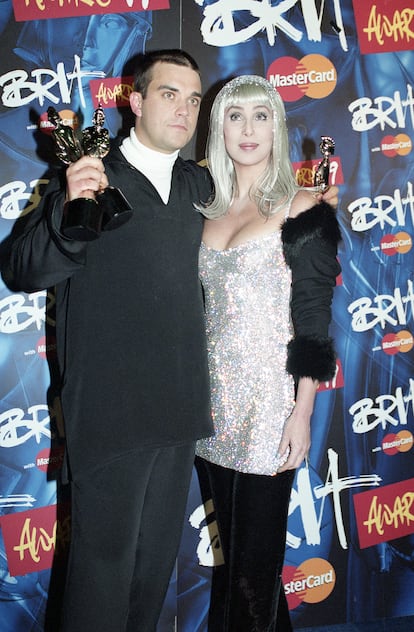
But from that key moment on, Williams kept growing. In 2002, he signed the largest record deal in the history of the United Kingdom with EMI (£80 million at the time, almost €92 million). A year later, he filled the legendary Knebworth Park for three consecutive nights, something that no other artist had achieved before. More unexpected still was his return to Take That in 2010, rewriting the band’s history and changing its ending. Although it seems that he had disappeared from the public eye in the last decade, he performed at the opening ceremony of the 2018 World Cup in Moscow.
What have been the keys to his long-lasting success? “Robbie Williams has played at dismembering the pop star and glorifying the imposed sophistication of the crooner. And as if that were not enough, he has outlived himself,” says J. Martínez.
According to Patricia Alvarado, “for him, art is pure entertainment. He gives himself completely to the public to amuse them, which on occasion has earned him the tag of a buffoon. He doesn’t mind dressing up as the members of Kiss, becoming a James Bond or even a 50s-style heartthrob crooner, among a thousand other things. And when he comes offstage he’s even more eccentric: he fears an alien attack, he brings himself to the brink of death on a diet of fish, and he does horrible things like turning his wife’s birth into a circus. You wonder if that’s part of the show too, which would make it even scarier. In the end, you forgive some things, when you hear him constantly talk about redemption in his songs or playing a football fan in the video for Lightning’s Three Lions Seeds. Robbie is one more of those broken souls in the industry, and he acts like one, but now he can yell from the rooftops that he is unbeatable. His career is well-rounded. The awards and number-ones reflect that: in the United Kingdom he has 13, two less than The Beatles. There will be those who don’t support him, but in general people adore him, because Robbie is disgustingly human. It is possible to see in him a part of ourselves. Where will that enormous capacity for reinvention that he possesses take him? I am dying of curiosity to discover it,” says the head of Afterpop.
“I saw him in Madrid on his last live visit, in 2015, at a time when I no longer followed him with the same fervor. He surprised me again, because he still had the ability to get the public in his pocket, and with all the experience of someone who knows how to handle a show for the masses without any problem. Anyone who is born a good performer will remain one until the end, no matter how much he goes astray along the way,” concludes Agustín Gómez Cascales.
Tu suscripción se está usando en otro dispositivo
¿Quieres añadir otro usuario a tu suscripción?
Si continúas leyendo en este dispositivo, no se podrá leer en el otro.
FlechaTu suscripción se está usando en otro dispositivo y solo puedes acceder a EL PAÍS desde un dispositivo a la vez.
Si quieres compartir tu cuenta, cambia tu suscripción a la modalidad Premium, así podrás añadir otro usuario. Cada uno accederá con su propia cuenta de email, lo que os permitirá personalizar vuestra experiencia en EL PAÍS.
¿Tienes una suscripción de empresa? Accede aquí para contratar más cuentas.
En el caso de no saber quién está usando tu cuenta, te recomendamos cambiar tu contraseña aquí.
Si decides continuar compartiendo tu cuenta, este mensaje se mostrará en tu dispositivo y en el de la otra persona que está usando tu cuenta de forma indefinida, afectando a tu experiencia de lectura. Puedes consultar aquí los términos y condiciones de la suscripción digital.
More information
Últimas noticias
Chris Martin, Taylor Swift, Elijah Wood and other famous wedding ‘crashers’
‘How does it feel to be a failure?’: Elizabeth Berkley’s journey from ‘Showgirls’ ridicule to vindication
The story of the Málaga virus: The code that haunted Google’s cybersecurity center director for 30 years
The impact of Ecuador’s mega-prison: A polluted river, cleared forests and military checkpoints
Most viewed
- Christian Louboutin: ‘Young people don’t want to be like their parents. And if their parents wear sneakers, they’re going to look for something else’
- The low-cost creative revolution: How technology is making art accessible to everyone
- Liset Menéndez de la Prida, neuroscientist: ‘It’s not normal to constantly seek pleasure; it’s important to be bored, to be calm’
- All the effects of gentrification in one corner of Mexico’s Colonia Roma
- December Social Security and SSI payments: Dates, double checks and the 2026 COLA increase


